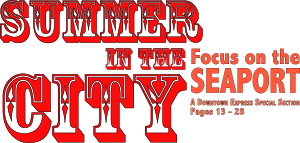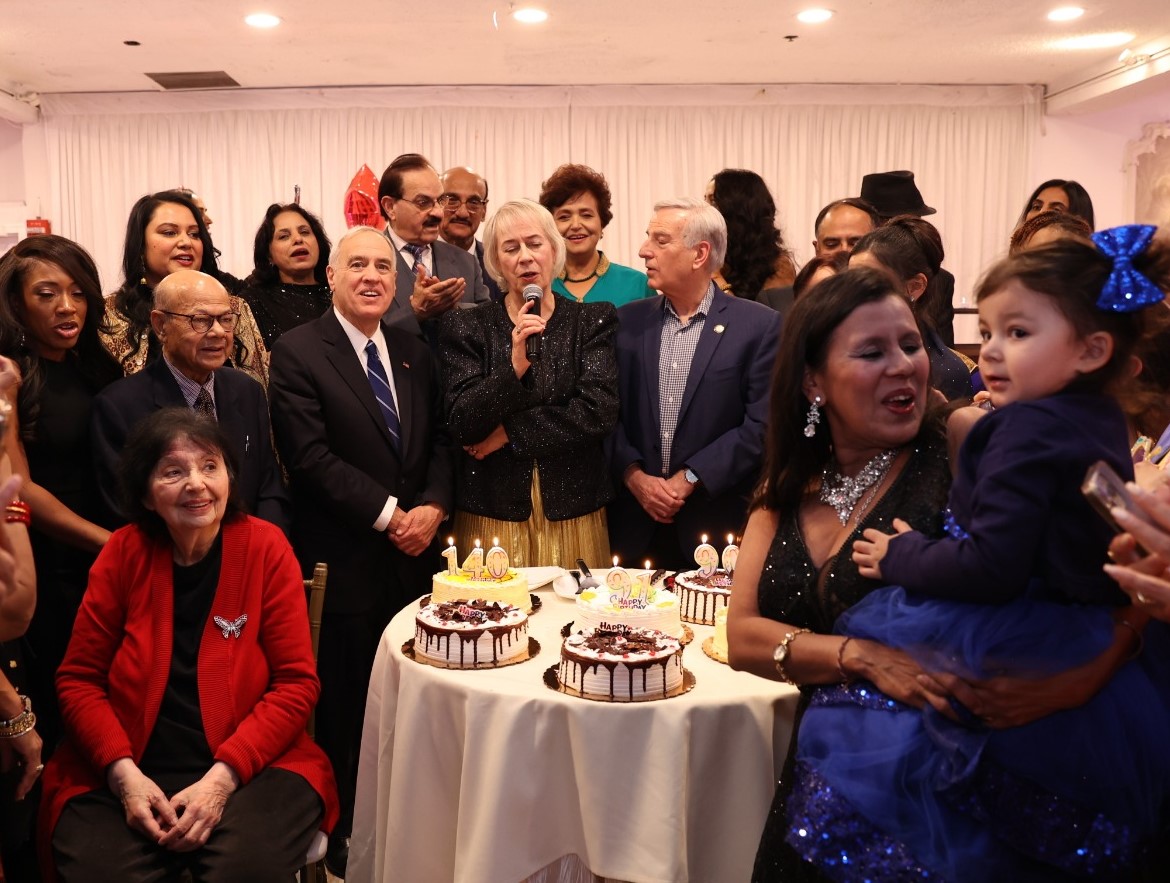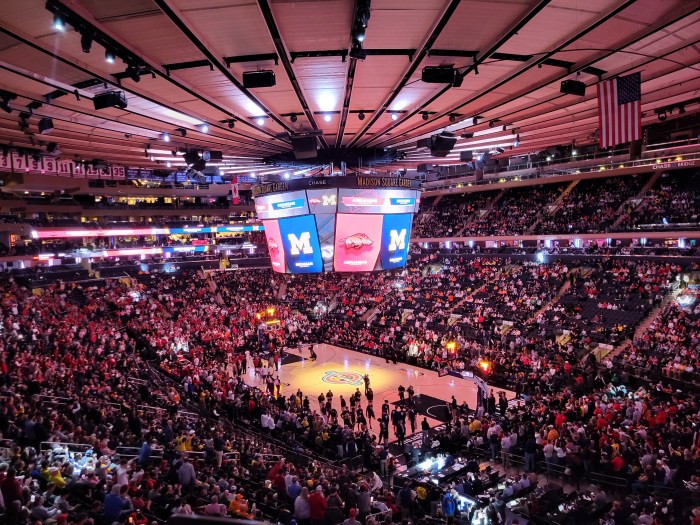By JERRY TALLMER
FIRST ANNUAL SEAPORT SUMMER THEATRE FESTIVAL
August 2-August 26
S-P-A-C-E gallery
207a Front Street (at Beekman)
South Street Seaport
$18 a show, or all three shows for $30
(212-868-4444; www.smarttix.com)
Director Jeff Cohen with actress Margaret Nichols at a rehearsal of his upcoming Seaport Theatre Festival at S-P-A-C-E, 207a Front Street On the balcony, actors Patrick Pizzolorusso and Gene Gallerano take a break.
All changed, changed utterly:
A terrible beauty is born.
— Yeats, Easter 1916
All changed, yes, changed utterly, a change within all of us, forever, in that choking rain of blood-scorched white dust. September 11, 2001. Changed not for beauty but for death.
“In These Times” is the Hemingwayesque title of Jeff Cohen’s series of vignettes — snapshots, he calls them — of the all but imperceptible wallop of 9/11 on the interiors of a handful of disparate New Yorkers in ordinary circumstances — in a classroom, at a playground, on a bench, in an office, on a bed of would-be carnal copulation.
Well, in the case of Miss Silverman, a substitute high-school teacher, the impact has been not exactly imperceptible. The day before the police have come into that classroom and taken away one of the students and the popular regular teacher, Mr. Hussein. The longest monologue in “In These Times” is given to Miss Silverman’s tense, over-the-top admonitions to the shaken kids to be “more vigilant about our safety and the safety of our society.” After all, she tells them, Mr. Hussein — “an Arab man” — may have had some connection to the terrorist highjackers.
The World Trade Center, eight short blocks straight across Lower Manhattan from the South Street Seaport, was much on Jeff Cohen’s mind when he and actor Adam Hirsch thought up — created — the First Annual Seaport Summer Theatre Festival that is to blossom next month, August 2 through August 26, in the vast S-P-A-C-E Gallery, 207a Front Street at Beekman Street.
In the fall of 2001 playwright-producer-director Cohen was in the second or third year of luring audiences interested in breakthrough theater down to his tiny (45 seat) Tribeca Playhouse on Reade Street, three blocks from what in one hellish hour would turn into Ground Zero.
That also made it the closest Manhattan theater to Ground Zero. Cohen and his then partner, Carol Fineman, immediately turned Tribeca Playhouse into a stage-door canteen (reminiscent of World War II) doing shows for World Trade Center rescue and cleanup workers.
“Crazy time,” says Cohen today. “Ten weeks of an amazing roster of stage, screen, and television stars who came down to entertain the troops.” It got written up everywhere and won a special Drama Desk Award.
Cohen, whose impact on our awareness had started with his brilliant, time-hopscotching “The Seagull: The Hamptons: 1990s,” starring an unknown Laura Linney and an unknown D.B, Sweeney, in a church gymnasium on East 4th Street, got a call some months ago from Adam Hirsch, who had been in some of Cohen’s shows.
“You have to see this space I’ve just wandered into,” Hirsch said to him. “It’s so spectacular, we have to have a festival.”
What Hirsch had wandered into was in fact S-P-A-C-E, an art gallery and performance spread founded by Jim Wintner, Richard Sack, and Florence Wack as the non-profit Seaport District Cultural Association.
“I pitched them this idea,” says Cohen, “and they went for it.”
The First Annual Seaport Summer Theatre Festival is a tripartite combo.
Top of the menu is William Shakespeare’s “Twelfth Night,” directed by Cohen, starring Stephen Largay as Sir Toby Belch, with Adam Hirsch as Orsino.
“I picked it because, 1) it takes place in a seaport and, 2) the seaport is in Illyria, which to me has always felt like Alice in the Looking Glass or Alice Down the Rabbit Hole. And the art works at S-P-A-C-E also have that Alice in Wonderland feeling.”
Performances of “Twelfth Night” are Thursdays and Saturdays at 8 p.m., Sundays at 2 p.m.
Second course is “Snapshots 2007,” four short plays by three writers, as follows:
“Bridesmaid” and “The Interstate and On,” by Clay McCleod Chapman (“both about quirky, funny women,” says director Cohen).
“First Date,” by Patrick Blake (“a wonderful play about a young actress who goes on a series of blind dates, and we watch her change as the vortex of New York City chews her up and spits her out”).
“In These Times,” by Jeff Cohen, in which, among other things, a mother watching her child in a playground suddenly starts crying over nothing at all; and two men on a bench flinch with horror as a jet zooms overhead a bit low.
“I think we’ve all experienced that,” says Cohen. “I know I still do.”
The “Snapshots 2007” package is Fridays and Sundays at 7 p.m., Saturdays at 3 p.m.
And then, for what the Brits call “savory,” the Festival comes up with Late Night Comedy, 11 p.m. Saturdays.
Might you do it, the press inquires.
“Be funny? No,” says Cohen. Then: “Make you a deal. I’ll do it if you do it.”
The actress who has to handle the teacher’s long, hysteria-edged monologue in Cohen’s “In Our Times” is Gabrielle Maisels, who last year was in his “Men of Clay” — “about my dad, and my growing up in Baltimore.”
Jeff Cohen’s dad, who’s coming up on 83, is Stanley Cohen, a salesman who for some years handled season-ticket sales, promotions, “and almost everything else” for the Bowie Bay Sox, a Baltimore Orioles’ farm team near Annapolis.
Yes, Jeff is — “unfortunately” — an Orioles fan. “But I subscribe to the ABY cult. Anyone But Yankees.”
Life after 9/11 goes on. September 17 marks the second anniversary of the marriage of Jeff Cohen, man of theater, and Sydney Thomas, civilian. Actually, a store executive.
“We met at the [West] 72nd Street dog run. That’s why my theater company is now called Dog Run Rep.” He’ll go on telling you about his dogs and her dog if you give him half a chance, but better he should talk about Illyria and Alice in Wonderland and that 9/11/01 which knocked Illyria out of the box forever.




































